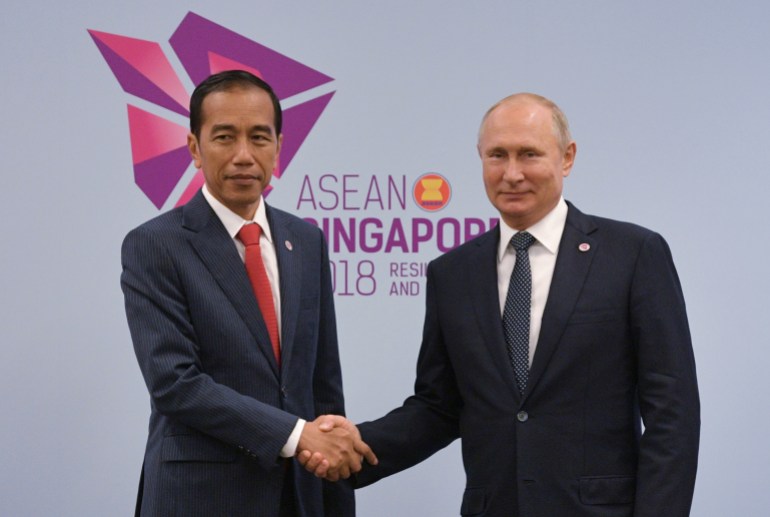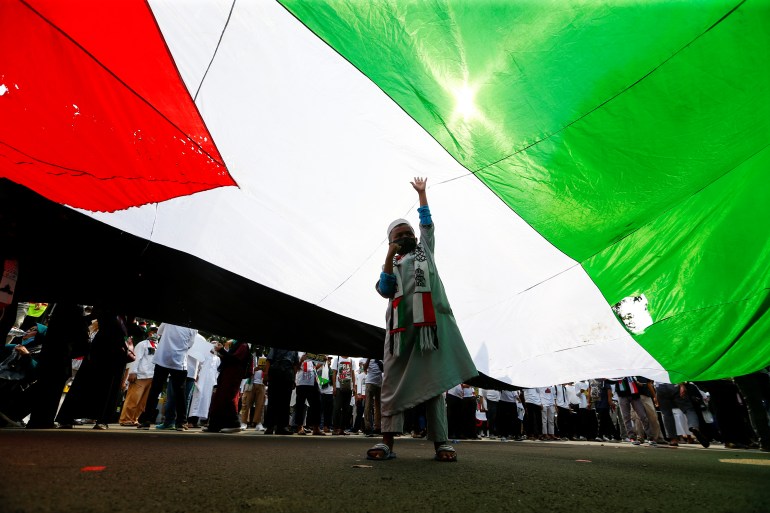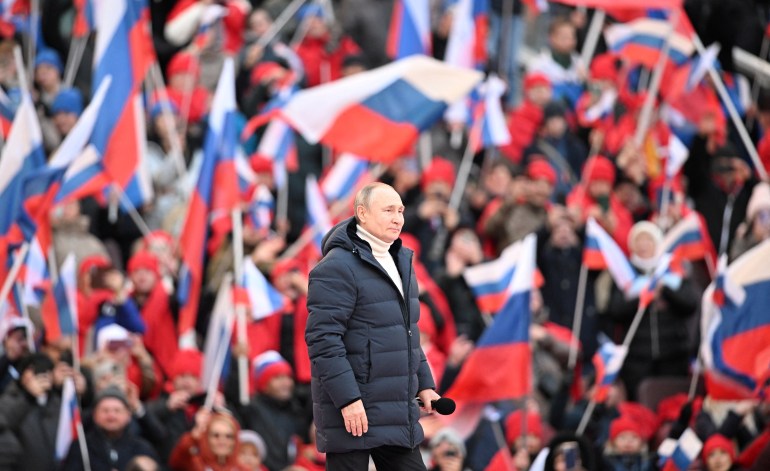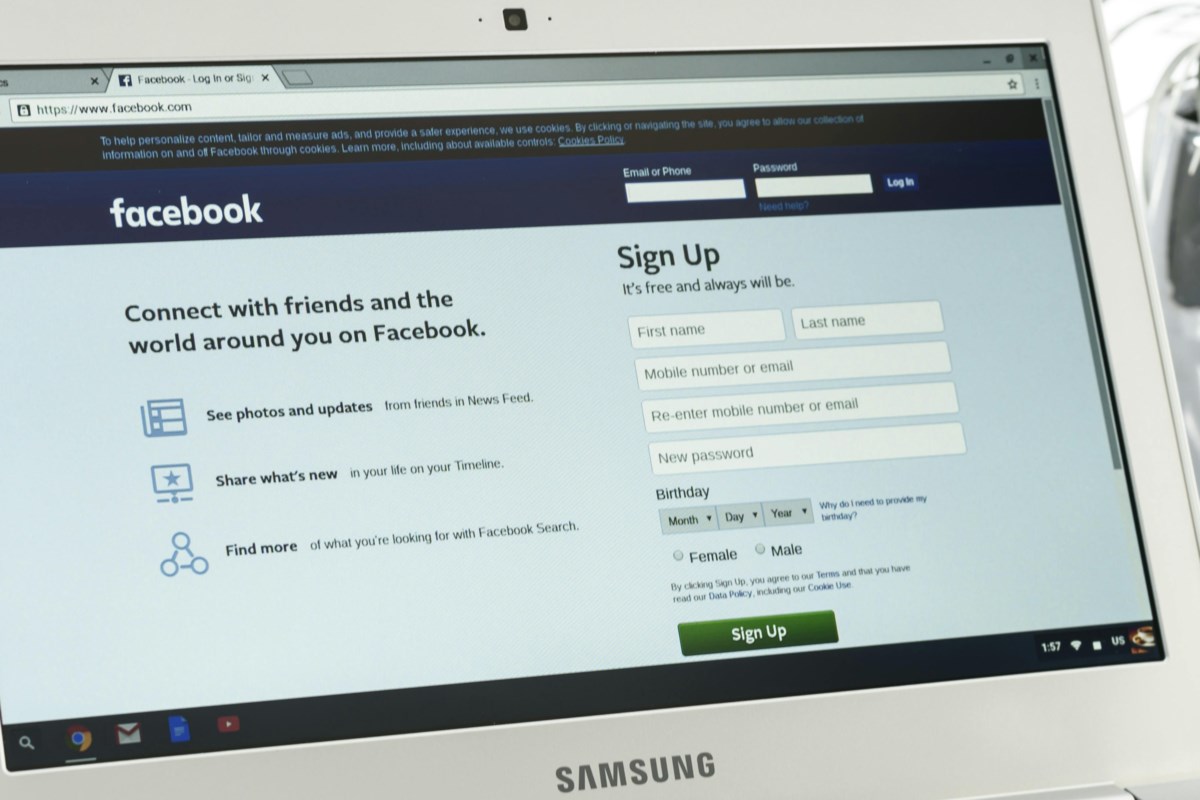Media
Why are Indonesians on social media so supportive of Russia? – Al Jazeera English
Medan, Indonesia – In recent weeks, a story resembling one of Indonesia’s many popular soap operas has been doing the rounds on the country’s social media.
In the tale, a woman and her loyal husband divorced, and he agreed to pay off her debts while giving her custody of their three children. But after a rich neighbour seduced the woman, her ex-husband was so furious that he took one of the children back. The two others, meanwhile, demanded that their father discipline their mother.
But the deeply misogynistic story, with its depictions of domestic violence, is no soap opera.
It is actually pro-Russia messaging, with Russia cast as the wronged man and Ukraine in the role of the ex-wife. The rich neighbour is the United States, and Crimea, Donetsk and Luhansk, the three children.
The story is thought to have first appeared on the Chinese messaging app Weibo in the days following the Russian invasion of Ukraine, but its enthusiastic reception in Indonesia through Whatsapp groups and on other social media platforms, including Twitter and Facebook, suggests an increasingly pro-Russia stance among Indonesians, which has caught some by surprise.
“Pro-Russian social media has been quick to frame the war to favour Russia,” Alif Satria, a researcher in the Department of Politics and Social Change at the Centre for Strategic and International Studies (CSIS) Indonesia, told Al Jazeera.
“Using memes and imagery that are appealing to Indonesians, they portray Russia as a dutiful husband who wants to win back Ukraine, an ungrateful ex-wife who sided with European thugs and has held their children, ethnic Russians, hostage.”
As a result of such imagery, in the three weeks since the war began, something of a split has emerged between Indonesia’s official stance, and social media as well as online commentary that is more sympathetic to Russia, if not outright supportive.
Indonesia voted in favour of a UN General Assembly resolution condemning Russian aggression as well as the UN High Commissioner on Human Rights decision establishing an independent commission to investigate alleged human rights violations. President Joko Widodo also called for a ceasefire in an interview with Nikkei Asia on March 9.


According to Yohanes Sulaiman, a lecturer in international relations at Universitas Jenderal Achmad Yani in Bandung, part of the issue lies in a dislike of the US harboured by some Indonesians, even though they might previously have come out in protest against Russia’s wars in Chechnya and its attacks on Syria.
Much of the distrust stems from the period after 9/11 and the Indonesian response to the US’s so-called ‘War on Terror’ in the Muslim-majority nation.
“[Pro-Russia Indonesians] do not like and trust the United States. People saw the US attacking Afghanistan and Iraq in the past for reasons that were considered fabricated like the 9/11 conspiracy and the lack of Weapons of Mass Destruction [used as the pretext for war in Iraq].”
“This has had an impact on them questioning the credibility of news sources, in the sense of the US mass media. Many state that they can’t just accept news from the US without reading the other side – but the root of this is their distrust of the US in general,”
Surveys by the Pew Research Center in Washington, DC, have shown more scepticism towards the US in Indonesia than many other countries in the Asia Pacific.
A Pew study released in February 2020 showed just 42 percent of Indonesians with a favourable view of the US, the lowest of the six countries surveyed.
The allure of the macho man
Indonesians also tend to view the situation in Ukraine through the prism of other conflicts.
More than 90 percent of Indonesia’s 270 million people are Muslim, and support for Palestinian rights has traditionally been high. The country has no formal ties with Israel.
“There is a problem of double-standards and whataboutism in which Israel terrorises Palestine, and so why isn’t there a problem with that, but Ukraine is an issue?” said Sulaiman.


Still, Satria cautions that online support for Russia in Indonesia remains anecdotal and that there has not yet been “any study or effort to truly grasp and understand how widespread these sentiments are in the Indonesian public.”
Russia is notorious for the activities of its online disinformation campaigns and studies have found the St Petersburg-based Internet Research Agency worked to manipulate the outcome of the 2016 election in the United States.
The country has also sought to burnish its reputation in the archipelago in recent years, according to Radityo Dharmaputra, a lecturer at the Department of International Relations, Universitas Airlangga, with Moscow making “concerted efforts to portray Russia as a friend and ally of Islam”
Writing in a blog for the University of Melbourne, Dharmaputra notes Russia has established a science and culture centre in Jakarta, set up an Indonesian language version of the Russia Beyond the Headlines website and provided scholarships for Indonesian students as well as funding for centres of Russian Studies at Indonesian universities.
“An absence of credible news outlets with the resources to send their own investigative journalists into the war zone and the apparent lack of Russian and East European specialists in Indonesian academic circles has created (a) vacuum of credible information, informed analysis, and a clear standpoint on the Russian war on Ukraine in Indonesia,” he wrote.
“This has been filled by latent anti-American and anti-western perspectives, the idealisation of strong leaders like Putin, religious arguments suggesting Russia is an ally of Islam, and pervasive pro-Russian public diplomacy and propaganda. Poor digital literacy in Indonesia has meant pro-Russian perspectives have taken hold relatively easily.”
Indonesia is no stranger to strongmen like the Russian president – a man known for his penchant for macho photoshoots.
Late President Soeharto, a former general, ruled Indonesia with an iron fist for more than 30 years until the late 1990s and many Indonesian politicians past and present have had ties to the military or come from politically-elite families.
“The high popularity of a figure like Putin speaks, I think, to Indonesia’s own illiberal and militarist political culture and authoritarian history,” Ian Wilson, a lecturer in politics and security studies at Murdoch University in Perth, Australia, told Al Jazeera.
“Authoritarian strongmen have long been perceived favourably, as decisive and steadfast, with aggression and contempt for rights interpreted positively as a sign of resolve. It’s worth remembering that there remains significant sentimentality for the former dictator Soeharto.
“It’s also perhaps no coincidence that popular political figures with militarist pasts and a strongman image, such as Prabowo Subianto [former presidential candidate and now defence minister], have at times been favourably compared to Putin.”
Sulaiman agreed that, for many Indonesians watching from afar, a figure like Putin is more relatable than Ukraine’s President Volodymyr Zelenskyy, a former comedian who won Ukraine’s version of Dancing with the Stars in 2006.
While Zelenskyy has remained in Ukraine and has inspired many with his video updates for the Ukrainian people and stirring speeches to western parliaments, this does not necessarily translate well for an Indonesian audience.
“In Indonesian political culture ‘strongmen’ are characteristically autocratic, demagogic and dismissive of democratic processes,” said Wilson. “Many see this in Putin, but not in a figure such as Zelenskyy who is often characterised in commentary as a ‘puppet’ of external forces, despite his emergence as a genuine leader in a time of crisis.”
“Putin is considered a cool, strong person, and many netizens really like that kind of figure,” Sulaiman agreed.


Age too is a factor as Indonesians tend to gravitate towards older leaders.
“Back in 2004, many Indonesians said that they voted for [former president] Susilo Bambang Yudhoyono on the grounds that he was handsome, dashing, and that he had better photos than his opponents.”
Media
PART 2: Is social media the great equalizer or the great menace? – OrilliaMatters


Editor’s note: The following is the second instalment in a three-part series. To read Part 1, click here.
Depending on who you talk to, social media is either a great equalizer or a great menace.
Some folks believe it’s a great equalizer because it can give a platform to every voice.
Others think it’s a great menace for the same reason.
Essentially devoid of rules, restrictions or any code of conduct, social media can be a battleground — divisive, antagonistic and intolerant.
Linda Myles is the administrator of a Facebook group called Engaged Residents of Oro-Medonte (EROM), a private group of about 550 members that discusses the comings and goings in Oro-Medonte Township.
She said her experience being a victim of harassment, bullying, and misleading and false posts has made her more cautious about how she administers the EROM group.
“I don’t want anyone to be subjected to that in our group,” Myles told BarrieToday. “We have a zero-tolerance policy on abuse, personal attacks or false or misleading information about anyone.”
She said the group has removed and blocked 11 profiles in two years.
“Most of those were because the person engaged in ongoing personal attacks and/or disrespectful language,” she said.
Myles said some were removed when administrators discovered they were not using their real names.
Fake profiles and false identities are an ongoing challenge on social media. Creating one requires little effort. Googling ‘create a fake profile on Facebook’ generated about 158 million results in less than a second.
“I suggest there exist those who are emboldened by the faceless, anonymous and remote nature of social media that behave far differently online than they do in their daily face-to-face interactions,” said George Cabral, Springwater Township’s deputy mayor.
“One way to deal, as an individual, with this type of distortion is to tune it out and avoid participation as much as possible.”
In “real life,” Cabral said, people talk behind others’ backs all the time, but, for the most part, the person who is being talked about remains unaware because people are too polite to mention whatever the slight might be to their face.
On social media, though, not only do people comment, but they go out of their way to ensure the person who the comment is about knows the comment exists.
“Folks feel emboldened to write/say whatever they might normally only say in private or behind one’s back,” Cabral said, “but there it is, completely out in the open for anyone’s eyes to see or ears to hear, including the individual to whom the comment was directed.”
Don Lewis is the administrator of a Facebook group called Oro-Medonte Community Matters. The group features new posts almost daily, many of them pointedly critical of members of Oro-Medonte council. The group has almost 1,000 members.
A number of Oro-Medonte councillors called the site out for distributing misinformation, posting personal attacks on council members and generally stirring the pot.
They claim Lewis is not a real person — that it’s a fake profile being used to conceal the identity of a disgruntled resident.
“I’ve been called Don Lewis all my life. I live in Oro-Medonte,” Lewis said during an exchange on Facebook with BarrieToday.
“I hear all the accusations made against me, but I just don’t care.”
According to Lewis, the Oro-Medonte Community Matters page allows anonymous contributions because there are ratepayers who are afraid to speak publicly due to having been bullied and having lost business due to their companies having been targeted by people whose opinions differed from theirs.
“This is a way to allow freedom of expression without exposing people who are at risk,” he said.
Lewis also claims some of his group’s members have had anonymous, defamatory letters sent to their employers.
When asked to provide specific instances or names of people who have been bullied or lost business due to their comments, Lewis didn’t provide any.
He said the issue is not about who is doing the posting, but rather what is being posted.
“Simply posting facts is not bullying,” he said.
But the root issue, according to some township councillors, is the veracity of those facts. They point out municipal politics is filled with moving parts; some decisions are made in public and some are made in closed session. Unless you’re privy to all of those conversations, any speculation is just that.
“The opportunity to disseminate distortion, perpetuate false narratives and create controversy, to my mind, anyway, weaponizes social media far too easily, taking it far from the good, valuable communications tool it was meant to be,” said Cabral.
“That is the difficulty. And while I do believe it’s a small percentage of users, the numbers don’t matter when their frequency and reach can be so vast digitally. With one post followed by a click of a button, a comment — good or bad — can be instantaneously posted to a myriad of social media accounts.”
‘Russ Logan’ is the administrator of the Springwater Ontario Discussion Group, which has about 1,000 members. He is quick to point out Logan is not his real last name. He said he’s a Springwater resident who uses a ‘nom de plume’ because of his job.
He said set up the group page to get people engaged and hopefully get some feedback local politicians would consider when making decisions for the community.
“I try not to censor too much unless it is completely rude and unhelpful,” he said during a Facebook chat. “To be mad is OK. To be insulting or threatening is unacceptable and will not be approved.”
Back in Oro-Medonte, Myles said Facebook needs to take an active role in controlling the online environment. She said she’s reported harassment and bullying to Facebook, but with no results.
“In my experience, Facebook does nothing,” she said. “There are far too many harassing, slanderous and defamatory posts allowed on Facebook.”
BarrieToday reached out to Facebook to find out how the social media giant defines harassment, bullying and intimidation, and what steps it takes when a complaint is made. Despite repeated requests, Facebook didn’t respond.
Media
Legal Fight Over Trump Media's Ownership Adds to Its Woes – The New York Times


Twenty years ago, Wes Moss and Andy Litinsky met Donald J. Trump as contestants on his reality TV show, “The Apprentice” — a connection that led them to help launch the former president’s social media platform, Truth Social, with his blessing.
Now, they might as well be starring in an episode of “Family Feud.”
For weeks, Mr. Moss and Mr. Litinsky have been fighting with Trump Media & Technology Group, the parent company of Truth Social, over their roughly 8 percent stake in the company. In February, they sued the company, claiming that Trump Media — which made its trading debut last month at an $8 billion valuation — was trying to deprive them of the full value of their shares. Now they also claim the company is trying to prevent them from selling those shares.
In a separate lawsuit that followed, Trump Media claimed that Mr. Moss and Mr. Litinsky should forfeit their shares because their poor decision-making had contributed to a yearslong delay in its merger with Digital World Acquisition Corporation. Trump Media agreed to merge with Digital World, a cash-rich shell company, in 2021 as a way to go public, but the deal closed only in March.
The pair’s stake is worth more than $220 million based on the current $26 share price of Trump Media, compared with $2 billion for Mr. Trump. Overall, the stock has fallen about 62 percent from where it began trading on March 26.
The litigation provides a portrait of some of the chaos that has bedeviled Trump Media since its inception. The lawsuits are also a distraction for the fledgling company, which is struggling to show that it is a viable business rather than a money-losing entity whose value is derived solely from Mr. Trump’s presence on its flagship platform. On Tuesday, the company announced plans to launch a streaming video service to draw in more users.
Mr. Moss, now an Atlanta financial planner and radio host, and Mr. Litinsky, a conservative media personality, met Mr. Trump during the second season of “The Apprentice,” which ran for 15 episodes in 2004. Mr. Trump “fired” the two men in Weeks 11 and 12. Mr. Litinsky would later take a job as president of Mr. Trump’s television production company.
Just weeks after Mr. Trump left the White House in early 2021, Mr. Moss and Mr. Litinsky pitched him on creating a social media company. They came up with the idea after Twitter, now X, and other social media platforms barred Mr. Trump in the aftermath of the Jan. 6 riot at the U.S. Capitol.
The two men convinced him that if he started his own company, he wouldn’t have to worry about being censored and his supporters would follow him to the new platform. Mr. Trump was intrigued enough to lend his name to the effort in exchange for a majority stake in the company. He didn’t invest any of his own money.
The parties drew up an agreement that authorized United Atlantic Ventures, a company set up by Mr. Moss and Mr. Litinsky, to put the plan in motion. In return, they were promised an equity stake in Trump Media.
Mr. Moss and Mr. Litinsky, who were on Trump Media’s board, were instrumental in negotiating the October 2021 merger agreement with Digital World, a special purpose acquisition company, or SPAC, that had raised $300 million in an initial public offering. SPACs raise money in an I.P.O. in order to buy an existing company like Trump Media, allowing the operating business to go public.
In February 2022, Truth Social made its debut, quickly becoming the former president’s main online megaphone.
Things soon began to go south, not long after Mr. Trump appointed Devin Nunes, the former Republican congressman from California, as Trump Media’s chief executive. By that summer, Mr. Moss had resigned from the company’s board; Mr. Litinsky had done so earlier.
In their lawsuit, filed in Delaware Chancery Court, the two men claimed that their relationship with Trump Media had soured after Mr. Litinsky refused Mr. Trump’s request to give some shares to his wife, Melania, long before the company began to trade.
Trump Media has claimed in its lawsuit, filed in March in Florida state court, that Mr. Moss and Mr. Litinsky “failed spectacularly at every turn.” The suit blamed the men for the poor rollout of Truth Social, which was marred by technical glitches that Trump Media said had generated “hostile” press coverage. Trump Media also said some of the actions of Mr. Moss and Mr. Litinsky had contributed to an investigation by the Securities and Exchange Commission that delayed the merger.
Christopher Clark, a lawyer for United Atlantic, said Trump Media’s lawsuit against his clients was “meritless.” He said that if Trump Media had any claims against his clients, it should bring them before the Delaware court rather than in a separate lawsuit in Florida.
This month, the judge in the Delaware proceeding, Vice Chancellor Sam Glasscock III, questioned the rationale for filing a suit in Florida, saying he was “dumbfounded.”
Samuel Salario, a lawyer for Trump Media, said that the company’s “complaint speaks for itself,” and that Trump Media would prevail in court.
In their lawsuit, Mr. Moss and Mr. Litinsky claimed their right to 8 percent of Trump Media’s shares and the ability to sell them immediately. They alleged that Trump Media had unfairly barred their company, United Atlantic, from selling any shares for six months, just as the merger with Digital World was being completed. The timing of the action was punitive and “retaliatory,” Mr. Moss and Mr. Litinsky alleged.
Trump Media has argued that the lockup is consistent with how other large shareholders are being treated and that, in any event, the two men forfeited their rights to those shares. The six-month lockup imposed on United Atlantic is similar to a share-selling restriction that also applies to Mr. Trump and investors who backed Digital World before the SPAC went public in 2021.
Legal experts said it was not unusual for founders of a company that went public to become embroiled in a battle over who should get the most shares.
“It’s all about dividing the pie but not about the fate of the pie itself,” said Usha Rodrigues, a professor of corporate law at the University of Georgia School of Law. “Donald Trump is still going to be in control. It’s just about sorting out the pieces.”
Mr. Moss and Mr. Litinsky aren’t the only ones fighting in court over their equity stake.
Patrick Orlando, the former chief executive of Digital World, is also suing to get more shares of Trump Media, claiming the SPAC’s board wrongly cast him aside a year before the merger was completed.
Mr. Orlando was pushed out in the middle of the S.E.C. investigation, in which regulators said early merger negotiations between Digital World and Trump Media had violated federal securities laws. The S.E.C. did not charge him with any wrongdoing, and Digital World eventually reached an $18 million settlement with regulators.
Mr. Orlando and his lawyers did not respond to requests for comment.
In claiming that Mr. Moss and Mr. Litinsky’s actions contributed to the regulatory investigation, the Trump Media lawsuit said the two men were apprehensive of how Mr. Orlando was conducting the merger talks but continued to negotiate with him anyway.
The suit noted that after one meeting with Mr. Orlando in April 2021, Mr. Litinsky wrote in his notes: “I get scared, is he wearing a wire?”
Media
Opinion | How to Regulate Social Media Without Hurting Free Speech – POLITICO
[unable to retrieve full-text content]
Opinion | How to Regulate Social Media Without Hurting Free Speech POLITICO





Source link
-



 Tech17 hours ago
Tech17 hours agoCytiva Showcases Single-Use Mixing System at INTERPHEX 2024 – BioPharm International
-



 Science23 hours ago
Science23 hours agoNasa confirms metal chunk that crashed into Florida home was space junk
-



 Politics24 hours ago
Politics24 hours agoThe Earthquake Shaking BC Politics
-
News19 hours ago
Tim Hortons says 'technical errors' falsely told people they won $55K boat in Roll Up To Win promo – CBC.ca
-



 Investment23 hours ago
Investment23 hours agoBill Morneau slams Freeland’s budget as a threat to investment, economic growth
-



 Politics22 hours ago
Politics22 hours agoFlorida's Bob Graham dead at 87: A leader who looked beyond politics, served ordinary folks – Toronto Star
-



 Health13 hours ago
Health13 hours agoSupervised consumption sites urgently needed, says study – Sudbury.com
-



 Tech19 hours ago
Tech19 hours agoAaron Sluchinski adds Kyle Doering to lineup for next season – Sportsnet.ca






